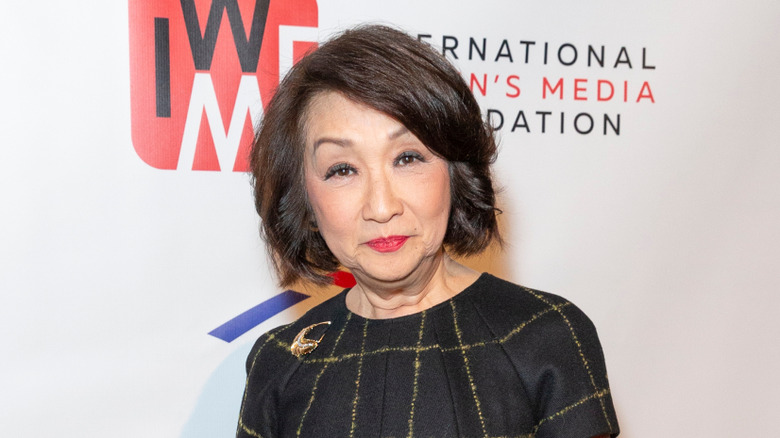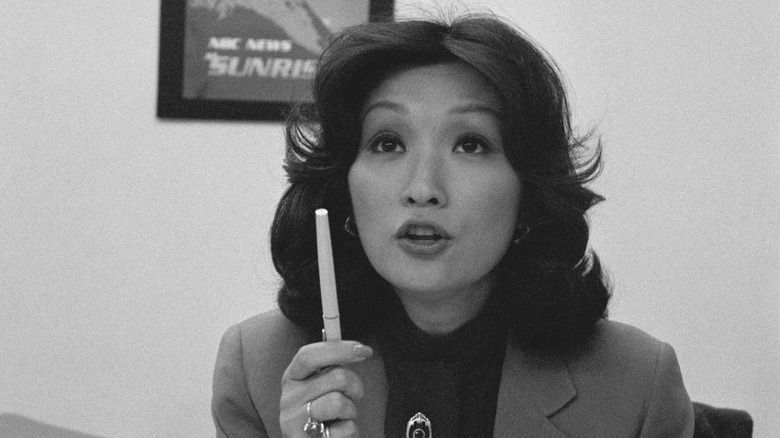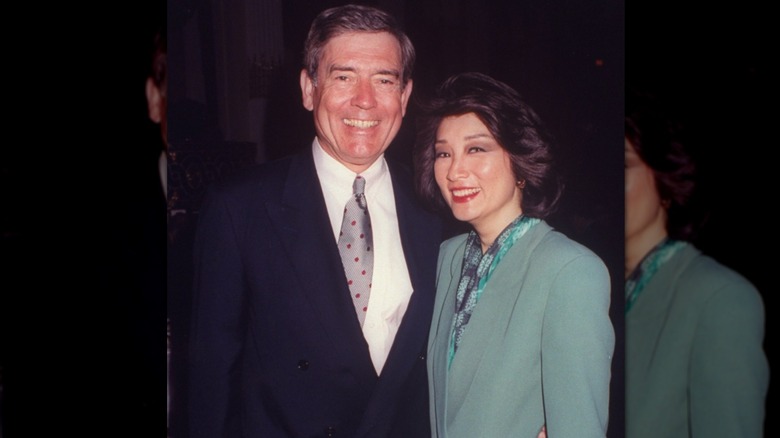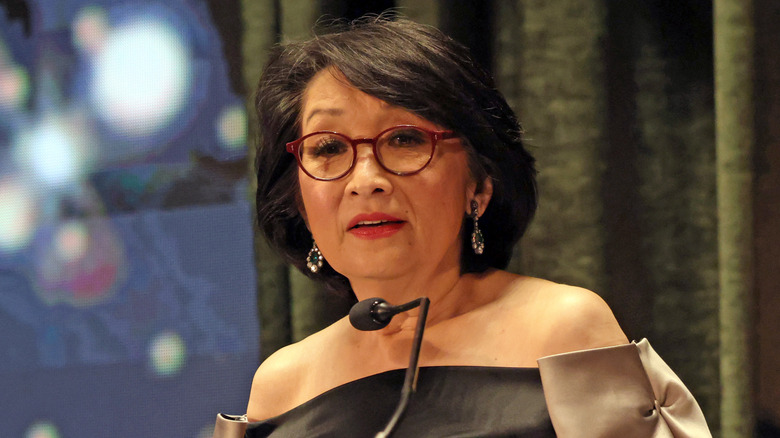Tragic Details About Former CBS Anchor Connie Chung
The following article includes discussion of sexual assault.
Throughout her life and her career, Connie Chung has been a groundbreaking and inspiring journalist who forged a path for so many to come after her. Born in Washington, D.C., in 1946, Chung would go on to report on the halls of power in her hometown. After graduating from the University of Maryland with a journalism degree, Chung struck out to make a life as an intrepid reporter and made history in the process.
Chung became the first ever Asian American and first woman to host a network news show at CBS in 1993, when she became the co-host of the "CBS Evening News." Throughout her expansive career, she interviewed countless world leaders and influential public figures and took home a Peabody Award and three Emmy Awards for her efforts. She's also enjoyed a marriage of over 40 years to fellow TV personality Maury Povich. Then her decision to step back from the spotlight in 2006 caused many to wonder what had happened to her.
However, Chung has never really stayed in seclusion. She's weighed in on politics, she's let people know what she really thinks about Donald Trump, and she's never been shy about spilling the tea about some of her former colleagues, including Bryant Gumbel. Along the way, she's also shared some truly tragic details about her life and her struggles — such as the racism and sexism she had to combat while moving up the ranks in the news world, as well as the bitter jealousy she's faced from some of her former co-anchors that made her life harder than it ever needed to be.
Connie Chung faced sexism and racism throughout her storied career
Connie Chung was a groundbreaker in the world of political reporting, and as such she had to contend with many politicians and influential figures — not to mention other journalists — who were not used to being interviewed and questioned by a woman. She would often find herself dealing with men who would rather hit on her than answer any hard-hitting questions. Chung spoke with Jane Pauley during an episode of "CBS Sunday Morning" in September 2024, and reflected on an encounter with former US Attorney General John Mitchell in the mid-1970s, when she was reporting from Washington, D.C.
"He looks at me and says, 'You look so pretty.' And I'm thinking to myself, 'What?' I'm not a lollipop. I'm not an ice cream cone,'" Chung recalled thinking. "Can you please treat me like the other male reporters?" In her 2017 memoir, "Connie," the veteran journalist explained that this was often the case with numerous politicians, including Henry Kissinger. "As I approached him with my microphone in hand, he'd flirt," she wrote (via CBS News). "There was little I could do or say to avoid those creepy old men."
As Chung explained in an interview with the Harvard Business Review, she relied on her "big sense of humor" and willingness to adapt her personality to find ways to ingratiate herself among her fellow journalists. While they were almost all white men, Chung worked hard to fit into the boys' club with her enthusiasm and attitude, while always being cognizant of just how prevalent sexism and racism were in nearly all facets of the industry at the time.
Connie Chung had to deal with a contentious working relationship with co-anchor Dan Rather
While Dan Rather was a respected journalist at the time, he and Connie Chung proved to be bitter rivals while co-hosting "CBS Evening News." Although they were all smiles in front of the cameras, behind the scenes there was palpable tension. Chung detailed their contentious relationship in her memoir "Connie," and recalled how frustrating it was working alongside a man who seemingly had no respect for her. "Each time I covered a story, it seemed that Rather was unhappy," Chung wrote (via Vanity Fair). "He quietly made it clear that he thought the story should be his."
Chung said that, after she'd snagged some high-profile stories covering breaking news in the field, Rather chastised her and told her she should stick to simply reading the news as an anchor, and make room for the real journalists to do the real work. This was not something Chung had any intention of doing, and the fighting led to her eventually parting ways with "CBS Evening News," and later moving on to work as an anchor on "20/20."
"I don't blame him totally, because he had owned Walter Cronkite's chair for many years and had to move over a few inches to make room for me," Chung wrote of her feud with Rather during their time together. "And I do believe that had I been another man, had I been an animal, had I been a plant ... he would not have wanted anyone to share that seat with him." Rather's ambition drove him to rebel against the very concept of having a co-anchor, but his insecurity about his reputation meant Chung had to work in a hostile and fragmented environment throughout her career-making turn on primetime.
Connie Chung opened up about being sexually assaulted by her family doctor
In October 2018, Connie Chung penned an op-ed in the Washington Post in which she got candid about a traumatic experience from her childhood. The piece was written in solidarity with Christine Blasey Ford, who had just come forward with allegations of sexual assault against Supreme Court Justice Brett Kavanaugh, who was then a nominee for the position. Chung wrote the essay as a means of showing her support for Ford and the courage it took her to voice her allegations to the world.
"I, too, was sexually assaulted — not 36 years ago but about 50 years ago," Chung wrote in her published letter to Ford. "I have kept my dirty little secret to myself. Silence for five decades." According to Chung, she was sexually assaulted by her family's long-time doctor in the 1960s, when she was in college. This doctor was the same man who had delivered her as a baby and who had served as a doctor for her family for many years.
Chung recalled that she'd gone to his home office to inquire about getting birth control. The doctor performed a gynecological exam, behaved inappropriately during the exam, and then kissed her after it was over, leaving her mortified and traumatized. "Christine, I, too, am terrified as I reveal this publicly. I can't sleep. I can't eat. Can you? If you can't, I understand. I am frightened, I am scared, I can't even cry," Chung wrote. "I wish I could forget this truthful event, but I cannot because it is the truth... Bravo, Christine, for telling the truth." Despite the traumatic nature of the event, Chung was able to overcome her fears to talk about it in the hopes her story would help Ford and others.
If you or anyone you know has been a victim of sexual assault, help is available. Visit the Rape, Abuse & Incest National Network website or contact RAINN's National Helpline at 1-800-656-HOPE (4673).



